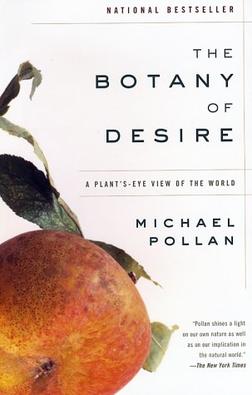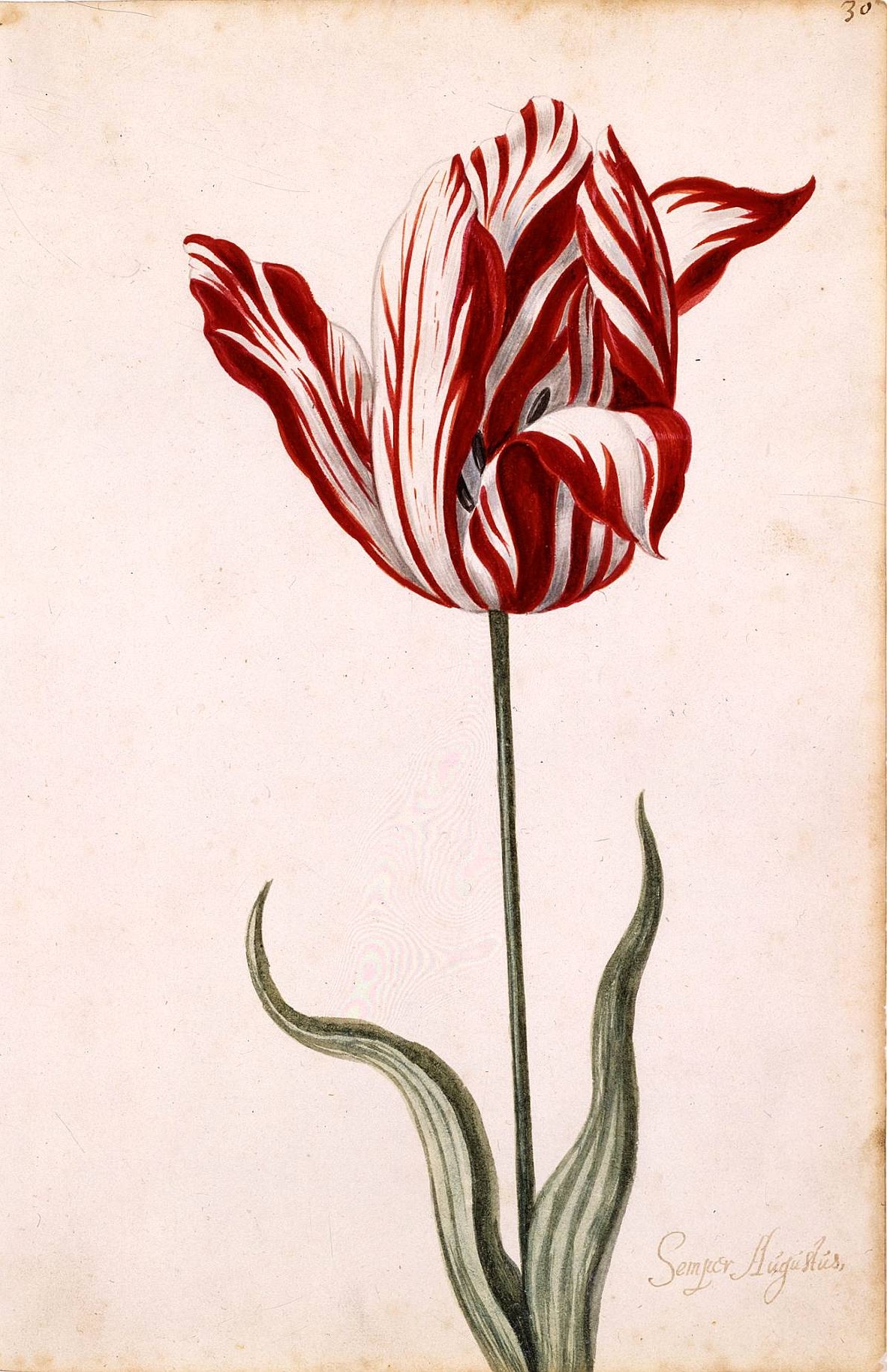Finally, I borrowed an audiobook version of a book I already had on my TBR pile! Hooray for me! That lucky book was The Botany of Desire, by Michael Pollan, and I'm really quite glad that I borrowed it. This is one of those books that I got soon after discovering farmers' markets and reading Animal, Vegetable, Miracle, and while I always knew I wanted to read it eventually, I never wanted to read it RIGHT NOW. But when you go through an audiobook every week or so, the pickings can get slim fairly quickly. It's easy to see everything on your quite extensive wish list and say "Meh" to it all. When that happens, I tend to force myself into reading a book I already own because, well, it's as good a way to choose a book as any!
So I can't say The Botany of Desire was chosen by me for any wonderfully momentous occasion. But I really enjoyed the whole book, and I am glad now that I've not pruned it from my shelves at all in the last 3.5 years while it sat unread.
The Botany of Desire is a book about evolution and artificial selection. But instead of assuming that it's humans that do the selecting and the domesticating, Pollan thinks about it from the plant's POV. All living things have a natural desire to pro-create; therefore, plants must have just as much a stake in their being domesticated as humans do, as it makes it a lot easier for them to thrive if someone is dedicated to taking care of them. It's an excellent premise (and, no doubt, is part of the reason I picked this book up 3.5 years ago), and Pollan's storytelling is top-notch. There is just something so great about books that combine science and history and social relevance, particularly when they are written well, and Michael Pollan does it REALLY well. So does Charles C. Mann. I assume Carl Zimmer is much the same.
Pollan focuses on four plants: apples, tulips, cannabis, and potatoes. He uses each of them to give us stories about the way humans interact with our environment - how we engage with nature, how we seek to control our surroundings, strategies we employ to become more efficient and effective, and just how all our actions impact the world around us. As someone who has a serious weakness for microhistories, this had massive appeal for me. I learned SO MUCH about Johnny Appleseed, who has had the misfortune of being scrubbed thoroughly clean by history, with all the rough edges smoothed. I also learned about tulip mania, and the semper augustus tulip and how, when you lived in Calvinist Holland in the 16th century, and everyone around you wore the same drab clothing and it was cloudy all the time, a brightly colored tulip really could be the most amazing thing you'd ever seen in your life and make you want it so much.
Pollan shares just as many interesting facts about marijuana (a plant whose development and evolution now have been as much determined by the war on drugs as by any other natural force) and the potato. And not only does he share facts about those plants, but he also gives us a lot of information about what humans are doing to the world around them. But not in a preachy way. Just in a - this is what nature would do, and this is what humans are trying to do. He visits Monsanto and potato farmers in Idaho and you can see how he struggles with the balance between plants that are highly productive and those that are, well, more natural. How he questions our monoculture farming practices, and our dependence on fertilizers; we keep making the exact same plants but bugs continue to evolve and adapt to those static plants.
It's a really interesting book and one that appeals to me on basically every possible level. If you are interested in fun dinner party facts or the food you eat or a history of the world from a new perspective, I would recommend checking this one out.
So I can't say The Botany of Desire was chosen by me for any wonderfully momentous occasion. But I really enjoyed the whole book, and I am glad now that I've not pruned it from my shelves at all in the last 3.5 years while it sat unread.
The Botany of Desire is a book about evolution and artificial selection. But instead of assuming that it's humans that do the selecting and the domesticating, Pollan thinks about it from the plant's POV. All living things have a natural desire to pro-create; therefore, plants must have just as much a stake in their being domesticated as humans do, as it makes it a lot easier for them to thrive if someone is dedicated to taking care of them. It's an excellent premise (and, no doubt, is part of the reason I picked this book up 3.5 years ago), and Pollan's storytelling is top-notch. There is just something so great about books that combine science and history and social relevance, particularly when they are written well, and Michael Pollan does it REALLY well. So does Charles C. Mann. I assume Carl Zimmer is much the same.
Pollan focuses on four plants: apples, tulips, cannabis, and potatoes. He uses each of them to give us stories about the way humans interact with our environment - how we engage with nature, how we seek to control our surroundings, strategies we employ to become more efficient and effective, and just how all our actions impact the world around us. As someone who has a serious weakness for microhistories, this had massive appeal for me. I learned SO MUCH about Johnny Appleseed, who has had the misfortune of being scrubbed thoroughly clean by history, with all the rough edges smoothed. I also learned about tulip mania, and the semper augustus tulip and how, when you lived in Calvinist Holland in the 16th century, and everyone around you wore the same drab clothing and it was cloudy all the time, a brightly colored tulip really could be the most amazing thing you'd ever seen in your life and make you want it so much.
Pollan shares just as many interesting facts about marijuana (a plant whose development and evolution now have been as much determined by the war on drugs as by any other natural force) and the potato. And not only does he share facts about those plants, but he also gives us a lot of information about what humans are doing to the world around them. But not in a preachy way. Just in a - this is what nature would do, and this is what humans are trying to do. He visits Monsanto and potato farmers in Idaho and you can see how he struggles with the balance between plants that are highly productive and those that are, well, more natural. How he questions our monoculture farming practices, and our dependence on fertilizers; we keep making the exact same plants but bugs continue to evolve and adapt to those static plants.
It's a really interesting book and one that appeals to me on basically every possible level. If you are interested in fun dinner party facts or the food you eat or a history of the world from a new perspective, I would recommend checking this one out.


Lovely! I really need to get to these authors. I love nonfiction and sciency books. I will look for this on audio now.
ReplyDeleteI can't believe this book has been on your tbr shelf for almost 4 years!! And you read it! ;-) Now I want to listen to this on audio.
ReplyDeleteThis is one of the books that changed the way I see the world; it had simply never occurred to me to consider the relationship between plants and humans as, just that, a relationship, with each party giving and receiving (in varied proportions).
ReplyDeleteWith each section, I thought, "well, I probably won't find this part as interesting" but, each time, I did. His style is remarkably inviting I think. If I'd discovered this kind of non-fiction earlier on in my reading life, I think my reading habits would be different now.
Congrats for striking another title off your TBR. Nicely done.
I'm in, so to speak. I loved The Omnivore's Dilemma and have had trouble choosing my next Pollan. This one sounds almost a step up from Dilemma and the style sounds the same.
ReplyDelete